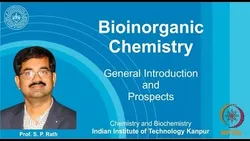
Biochemistry 
This Biochemistry course provides an introduction to the fundamentals of biochemistry. It covers topics such as protein structure, enzymes, photosynthesis, cell communication, illicit drugs, and pharmaceutical drugs. Through online learning, students will gain skills in biochemistry and learn how to apply them to real-world scenarios. The course is designed to help students understand the nature of disease and how to use inhibitors to treat it. ▼
ADVERTISEMENT
Course Feature
![]() Cost:
Cost:
Free
![]() Provider:
Provider:
Youtube
![]() Certificate:
Certificate:
Paid Certification
![]() Language:
Language:
English
![]() Start Date:
Start Date:
On-Demand
Course Overview
❗The content presented here is sourced directly from Youtube platform. For comprehensive course details, including enrollment information, simply click on the 'Go to class' link on our website.
Updated in [May 25th, 2023]
Biochemistry is a course designed to introduce students to the fundamentals of biochemistry. It covers topics such as protein structure, enzymes, photosynthesis, cell communication, and illicit and pharmaceutical drugs.
The course begins with an introduction to biochemistry, including the structure of proteins and the role of enzymes in the body. Students will learn about the different types of enzymes and how they work to facilitate chemical reactions in the body. They will also explore the structure of proteins and how they are formed.
Next, the course covers photosynthesis, including the light reactions and the Calvin cycle. Students will learn about the role of light in photosynthesis and how the Calvin cycle works to produce energy for the cell. They will also explore the role of photosynthesis in the environment and how it affects the global climate.
The course then moves on to cell communication, including hormones and neurotransmitters. Students will learn about the different types of hormones and neurotransmitters and how they work to regulate the body. They will also explore the role of hormones and neurotransmitters in the brain and how they affect behavior.
The course then covers illicit drugs and how they work. Students will learn about the different types of drugs and how they interact with the body. They will also explore the effects of drugs on the brain and how they can lead to addiction.
Finally, the course covers pharmaceutical drugs and the nature of disease. Students will learn about the different types of drugs used to treat diseases and how they work. They will also explore the role of inhibitors in the body and how they can be used to treat diseases.
Overall, this course provides students with a comprehensive introduction to biochemistry. It covers topics such as protein structure, enzymes, photosynthesis, cell communication, and illicit and pharmaceutical drugs. Students will gain a better understanding of how biochemistry works and how it affects the body.
[Applications]
The application of this course can be seen in many areas of life. Students can use the knowledge gained from this course to understand the biochemical processes that occur in the body, such as the structure of proteins, the role of enzymes, and the effects of hormones and neurotransmitters. They can also use this knowledge to understand the effects of illicit drugs and pharmaceutical drugs on the body. Additionally, this course can be used to gain a better understanding of photosynthesis and the Calvin cycle, which are essential for the production of food. Finally, this course can be used to gain a better understanding of the nature of disease and how inhibitors can be used to treat it.
[Career Paths]
1. Biochemist: Biochemists study the chemical processes and substances that occur in living organisms. They use their knowledge to develop new drugs, treatments, and therapies to improve human health. They also work to understand the molecular basis of diseases and develop new diagnostic tools. With the increasing demand for biochemists, this field is expected to grow significantly in the coming years.
2. Pharmaceutical Scientist: Pharmaceutical scientists are responsible for researching, developing, and testing new drugs and treatments. They use their knowledge of biochemistry and other sciences to create new medicines and therapies. This field is expected to grow as the demand for new drugs and treatments increases.
3. Clinical Research Associate: Clinical research associates are responsible for conducting clinical trials and collecting data. They use their knowledge of biochemistry and other sciences to ensure that the trials are conducted safely and accurately. This field is expected to grow as the demand for new drugs and treatments increases.
4. Biomedical Engineer: Biomedical engineers use their knowledge of biochemistry and other sciences to develop new medical devices and treatments. They use their knowledge to design and develop new medical devices, such as prosthetics and implants, as well as new treatments and therapies. This field is expected to grow as the demand for new medical devices and treatments increases.
[Education Paths]
1. Bachelor of Science in Biochemistry: This degree program provides students with a comprehensive understanding of the chemical processes that occur in living organisms. Students learn about the structure and function of proteins, enzymes, hormones, and other molecules, as well as the principles of metabolism, genetics, and cell biology. This degree is becoming increasingly popular as the demand for biochemists grows in the medical, pharmaceutical, and biotechnology industries.
2. Master of Science in Biochemistry: This degree program provides students with an advanced understanding of the chemical processes that occur in living organisms. Students learn about the structure and function of proteins, enzymes, hormones, and other molecules, as well as the principles of metabolism, genetics, and cell biology. This degree is becoming increasingly popular as the demand for biochemists grows in the medical, pharmaceutical, and biotechnology industries.
3. Doctor of Philosophy in Biochemistry: This degree program provides students with an in-depth understanding of the chemical processes that occur in living organisms. Students learn about the structure and function of proteins, enzymes, hormones, and other molecules, as well as the principles of metabolism, genetics, and cell biology. This degree is becoming increasingly popular as the demand for biochemists grows in the medical, pharmaceutical, and biotechnology industries.
4. Master of Business Administration in Biotechnology: This degree program provides students with a comprehensive understanding of the business aspects of biotechnology. Students learn about the principles of biotechnology, the regulatory environment, and the financial and legal aspects of the industry. This degree is becoming increasingly popular as the demand for biotechnology professionals grows in the medical, pharmaceutical, and biotechnology industries.
Course Provider

Provider Youtube's Stats at AZClass
Discussion and Reviews
0.0 (Based on 0 reviews)
Explore Similar Online Courses

Public Relations: Crisis Communications Oil and Gas Industry

Fundamental Neuroscience for Neuroimaging

Python for Informatics: Exploring Information

Social Network Analysis

Introduction to Systematic Review and Meta-Analysis

The Analytics Edge

DCO042 - Python For Informatics

Causal Diagrams: Draw Your Assumptions Before Your Conclusions

Whole genome sequencing of bacterial genomes - tools and applications

Principles of Biochemistry

Bioinorganic Chemistry

Essentials of Biomolecules : Nucleic Acids and Peptides
 Related Categories
Related Categories
 Popular Providers
Popular Providers
Quiz
 Submitted Sucessfully
Submitted Sucessfully
1. What is the main purpose of enzymes?
2. What is the main purpose of photosynthesis?
3. What is the main purpose of cell communication?


Start your review of Biochemistry